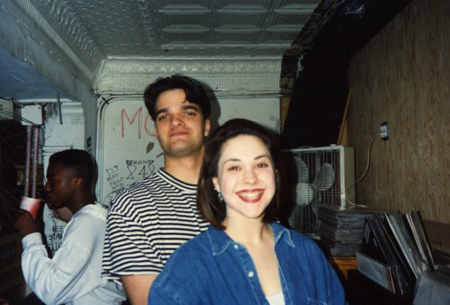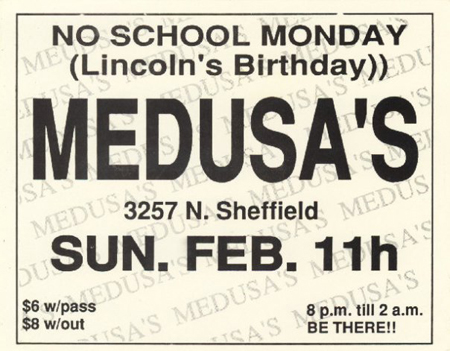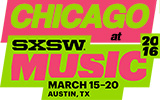| « Review: Fool's Gold @ Bottom Lounge | Last Banjo Standing Contest » |
Feature Thu Sep 24 2009
A Look Back in the Mirror at Medusa's
For the second article in an occasional series on long lost music venues in Chicago, Transmission takes a look at Medusa's, an all-ages music and dance club that was one of the first New York-style nightclubs to open in Chicago. See our previous look at Off The Alley here.
"you wouldn't believe me if I told you..15 going on 25......favorite color? BLACK! smoke cigs? yup. gotta square? a clove? 13 and drunk? i don't remember...beat up? fucked up? knocked up? new wave, house, industrial, hip hop slam dance, dirty disco, techno, this acid life..ahhhhh the memories...."
—Description of the Facebook page MEDUSA'S on SHEFFIELD in CHICAGO
In Greek mythology, if you stared directly at Medusa, the legendary female Gorgon with mesmerizing snake-hair, you turned to stone. In Chicago mythology, if you hung out just long enough Medusa's, the famed nightclub at North Sheffield Avenue and West School Street, you sure as hell didn't turn to stone.
Opened in the early 1980s, Medusa's on Sheffield was one of the defining nightclubs in Chicago's house music scene throughout the '80s and early '90s. "Dark, thumping, alive" and a melting pot with blobs of gum covering the sidewalk of the front entrance, Medusa's was the setting for several legendary Chicago stories: Billy Corgan and company wearing black velvet capes during one of the Smashing Pumpkins' first live shows, the late Studs Terkel saying, "Thanks for a great night. Is that Billy Idol?" and punk rocker GG Allin telling the crowd he was going to kill himself but instead, cutting his body and lighting equipment on fire.
Former site of Medusa's at 3257 N. Sheffield, Chicago
These are all words, stories and moments used to describe the irreplaceable atmosphere of the club, which has since been turned into offices and apartments. Despite being closed for more than a decade, Medusa tribute nights pop up in the city every so often, with a possible reunion scheduled for October. On the Facebook page "MEDUSA'S on SHEFFIELD in CHICAGO," 4,369 fans gush about how much the club impacted their lives.
"A Little City Within the Building"
Dave "Medusa" Shelton, 52, Chicago
There are certain facts about the club fit for textbooks, and much of the club's history is nicely written in an article on the Web site for the club's current Elgin location. The original Medusa's opened in 1982 or 1983 (Shelton can't remember which year for sure), after Shelton spotted a "For Rent" sign on an abandoned Swedish club at Sheffield and School. After spending some time hanging in Waikiki, Hawaii, Shelton (nicknamed Medusa because of his curly blond locks) returned home to his native Chicago with dreams of opening his own club. He spent years throwing unconventional parties all throughout Chicago, but finally spotted a perfect place at Sheffield and School. The club first opened as a late-night New-York style venue and then as an all-ages club, attracting suburban teens into the city, as well as club owners, performance artists, musicians and DJs.
"When we started, we really just wanted to hear great music and hang out with friends," Shelton remembers in a phone interview. "There was no big concept of making big money, just putting people we like in there. People kind of gravitated to us as a non-corporate environment. It was one big house party all the time."
The club would open for the all-ages crowd at 7:30 until about 10:30pm, when the club would shut down for a half-hour and reopen for the 18 and over crowd at 11, staying packed until 2 or 3am.
"I think there was just a hunger for that kind of scene, something really different," Shelton says. "We were everything that other places weren't, maybe that underdog, that outcast, more creative people, they were all thrown together. It made it more interesting. There were so many [people] segregated back then...everyone was equal in this place."
The club closed in 1992 after problems with the alderman led to Shelton not renewing the lease. A June 19, 1992 Tribune article about the club's farewell begins, "All good things must come to an end — and after almost nine years as one of Chicago's most colorful nightspots, Medusa's is shutting down its Sheffield Avenue location." A developer later turned the building into apartments and offices, which remains today. A Tribune article a few months after the club's closure called lonely teenagers looking for a place to hang out "Medusa's orphans." But before re-opening in Elgin about thirteen years ago, the club also briefly re-opened in the Congress Theatre. Another Tribune reporter followed around some teens in the new location, quoting one who says, "Walking into Medusa's is like walking into an all-ages party hosted by the Addams Family."
While there is a concrete start and end to the story of Medusa's on Sheffield, the story of Medusa's as a Chicago legacy doesn't have a clear beginning and certainly not an end. The club literally became a home to some people, with Shelton admitting that several people slept and lived in the club. A family of misfits, he says proudly, literally lived inside the club.
"It wasn't planted and contrived, it all happened naturally, which makes it kind of innocent, it makes it more fun," he says. "Back then, every night was some kind of circus, something off-the-wall. I don't measure it by celebrities."
Now 52 and a 30-year veteran of the club scene, Shelton still promotes shows and runs a different Medusa's in Elgin, where he grew up. He's seen technology change the way teens interact today -- for the better and worse -- but he's also seen self-expression become part of the mainstream. Club promotion, he says, is the only life he knows and loves.
"I like the chaos, the changing of it," he says. "There's always evolving going around, changing and connecting. I guess that fulfills something in me, the need of connecting with people...[even with] the headaches, it's kind of a fun career with music, people's creativity, and [seeing] how people interact, creating a little city within the building. People bring their stories to you, their lives. You learn about them, you learn about their families, and pretty soon you have some good friends."
Jennifer Marszalek, 40, Chicago
"Some super crazy shit happened behind the scenes, stuff that sometimes seemed unbelievable. But what happened at Medusa's stayed at Medusa's -- and helped forge our tight bond," remembers Jennifer Marszalek in an e-mail interview.
Marszalek started going to Medusa's in 1986 when she had just turned 17. She previously hung at McGreevy's in Niles a lot, and also worked at WLUW-FM for a show called Saturday Night Dance Party, where she played a lot of house and alternative music.
"At the time, it seemed everyone knew Medusa's was the place to be," she recalls. "My friend Ed from high school would drive from the southwest side to get me on the far north side and we went to Medusa's every Friday and Saturday night, Wednesday's also during holiday weeks. He logged a lot of miles on his Chevette every weekend. We never wanted to miss a night for fear we'd miss the most fun anyone had ever had."

Jennifer Marszalek at Medusa's
She quit working for WLUW-FM in 1998, and was soon hired by Shelton, who owned and managed Medusa's, to work in promotions at the club while simultaneously working as a college rep for Capitol/EMI promotions.
Marszalek appears on an MTV 120 Minutes taping of the show that featured a segment on the club, proudly standing still in jeans and a tee-shirt while a large crowd of sweaty dancers bop up and down. Asked by the host what the most disgusting thing she's seen at Medusa's, Marszalek replied, "After our Christmas party, we had a performance artist that was using dead cats. I came to work the next morning, and a dead cat wrapped in masking tape was on the door...It was gross."
Years later, Marszalek remembers the night of that taping as one of the busiest the club had seen. "There was a line out the door and around the building into the alley," she recalls. "We were packed for the All Ages and Late Night sessions, the energy was incredible. Rights of the Accused performed in the Rock Room and Danielle Dax made an appearance."
Marszalek worked at Medusa's until the club closed in 1992. Though Medusa's impact on her life wasn't something she thought about as a teenager, the club is something she's grateful for to this day.
"The exposure we had to music, culture, kids from all over the area was unique. There was never really anything that came before or after Medusa's that provided that kind of an experience," she remembers. "At the time the city, the neighborhood and many of our parents thought we were a crazy nuisance. But looking back, Medusa's kept us off the street and minimized (but could never fully stop) the prevalence of underage drinking and sex. I look back and think about how much fun I had. When I listen to friends that grew up in other cities or who never drove in from the suburbs on the weekends describe their social scene in high school and college, it really hits me how lucky I was to have Medusa's."
Sean O'Connell, 39, LA
Sean O'Connell, now an LA resident who works as the Director of International Business at the University of Southern California, still remembers Dec. 31, 1987 at Medusa's. The Revolting Cocks were scheduled to perform, and O'Connell remembers standing in the balcony, listening to all the other opening bands being "drunk and incoherent...and yet the energy was still palpable." Once the Revolting Cocks got on stage, O'Connell could feel the energy at Medusa's even more.
"I remember watching [founding Revolting Cocks member] Luc van Acker fall into the crowd, and everyone pulling on him," O'Connell recalls. "The other members of the band tried to help him up back on stage, and one kid would not let go, so he kicked him in the head. I cringe now at the memory, but at the time it seemed like the coolest thing ever. I immediately went downstairs and into the pit, where some crazy kid punched me in the back of the head. All I did was shake it off and kept slamming."

Medusa's poster courtesy Julie Cohen Hirsh on Facebook
After that night, O'Connell became a regular at the club for two years. Though he had been to the club a few times prior, "that was the first time I actually started to find my space at the club, and to understand the culture and my identity within it. It was also when they started letting me into the late-night sessions, even without an ID."
For O'Connell, there was no such thing as "typical night" at Medusa's. It depended on when you went, who was there and what room you hung out in. As the music being played in the dance room kept changing with the times, so would the people and the fashion.
On most evenings, O'Connell would meet his friends just outside the club, at a Dunkin' Donuts on Clark and Belmont or Fleets. He was "straight edge" at the time, and didn't drink, smoke or do drugs -- but he would watch his friends drink. He recalls:
"After they consumed enough alcohol not to remember anything, we would make our way to the club, say hello to the persons outside, to the people working the door, chat with Bleu, or Ara, or Mike or Victor. Would go inside, walk around the dance floor (which was always empty when we would arrive). If we did not see anyone we knew, or cared to talk with, we would head straight upstairs to the video room (or if I was thirsty stop for an Orangina on the first floor bar). We would bother [video DJ] Leroy, asking him to play certain videos (most of which were not part of his rotational, or that he was planning on showing later). If it was hot, we would hang out on the fire escape until we were told to shut the door. Dance in front of the screens. After an hour, head downstairs to dance (if the music was not good, or the crowd was boring, we would hang out upstairs until they kicked us out -- normally 1/2 hour or so before closing). If we were down on the floor, we would wait to hear favorites (Hassan, Vicious Pink, Data, Front 242, etc.) and then climb on one of the scaffoldings, or go way in the back to dance on the stage."
Inside, he remembers the entrance would open to a narrow staircase, with a podium at the top where a cashier or bouncer stood. Straight ahead, you could see the dance floor. The second floor had a balcony with a DJ booth and large empty rooms with occasional art installations. Another set of stairs led to the third floor, where there was a video room and bar/live music room.
"The main dance area was long and narrow. It had a bar at the left hand corner (as you entered), and a stairwell to the right, which led to the balcony. There was a stage area in the back of the floor. The floor would have different themes (one of my favorites was the Acid House with the melting "smiley faces." There would be a smaller stage as you entered (really just blocks on which people could dance) and often scaffolding near the stairs leading to the balcony as well as towards the back (later much of the scaffolding was removed)," O'Connell remembers.
Some of his favorite shows included Anne Clark, Ministry and The Smashing Pumpkins (who surprisingly weren't a crowd favorite at that time).
Lisa Park, 36, Chicago
Around the same time O'Connell found himself in Medusa's, Lisa Park waited in her bedroom at Hoffman Estates for the weekend to come. She started going to Medusa's nearly every week in the late 80s when she was 15. Her routine: She would leave her home in Hoffman Estates around 9:30pm, drive into the city with some older friends, and "look for parking forever and then stand in line freezing your ass off." She often got in with no cover (a "short skirt helped") and danced until the club closed. She and her friends would grab a meal at McDonald's before heading home. Park had to be up for church on Sunday or else she couldn't go out the next week.
Park remembers the inside as "dark, thumping and alive with people" with wet bathroom floors and clogged toilets. "There were all sorts of nooks and crannies to get in trouble in. To the right of the upstairs video screen was a speaker box with my name on it. It was never dull. No one ever gave you shit, you could just dance," Park remembers in an e-mail interview.
Her first show was seeing the Toasters, a seminal ska band from New York. "It was like nothing I had ever experienced," she recalls. "The lights, the people and the beat just got to me. Going to shows is still a favorite thing for me to this day." At the end of the night, she would hang out with Leroy, one of the video DJs she enjoyed talking to.
Park now works as a case manager for mentally ill adults with a history of homelessness. She works two buildings down from Medusa's, which still feels like home to her.
"I think being at that place at that time shaped who I am and what I enjoy," she says. "There was always drama and people doing what they shouldn't. At the core we were just a bunch of kids that only fit in there. There, we were welcomed. I often wish we could just all line up on School and Sheffield at 10:30 on a Saturday night waiting for the doors to open."
Medusa's Playlist
submitted by Sean O'Connell
"Hassan" by Fatima
"Native Love" by Divine
"Attack Ships on Fire" by Revolting Cocks
"Nemesis" by Shriekback
"Masterhit" by Front 242
"Our Darkness" by Anne Clark
"Glowing in the Dark" by Experimental Products
"Living Inside Me" by DATA
"Lyte as a Rock" MC Lyte
"I Will Refuse" by Pailhead
"Shiny, Shiny" by Haysi Fantayzee
"Big House" by Fou Gorki
"Cccan't You See" by Vicious Pink
"Poppa's Got A Brand New Pig Bag" by Pig Bag
"Supersonic" by J.J. Fad
"Welcome to Paradise" by Front 242
"Bela Legosi's Dead" by Bauhaus
"Bizarre Love Triangle" by New Order
"Sensoria" by Cabaret Voltaire
"World Destruction" by Time Zone
"Go" by Tones on Tail
"Situations" by Cetu Javu
"Din Da da Din" by George Kanz
"Los Ninos De Parque" by Les Liaisons Dangereuses
"Dead Eyes Open" by Severed Heads
"Cities in Dust" by Siouxsie & The Banshees
"Muscoviet Misquito" by Clan Of Xymox
"Kiss Me" by Tin Tin
"French Kiss" by L'il Louis
















Pete / September 24, 2009 9:40 AM
That is definitely a strong representation of music that one could potentially hear at Medusa's!